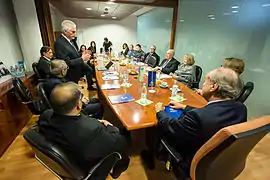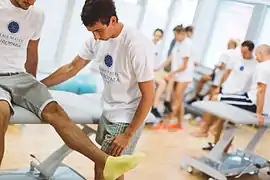| Type | University |
|---|---|
| Industry | University |
| Founded | 2007 |
| Founder | Evropska administrativna akademija (European Administrative Academy) |
| Headquarters | , |
Area served | Slovenia & International |
Key people | Ludvik Toplak (president) |
| Website | http://www.almamater.si http://www.almamater.eu |

Alma Mater Europaea – European Center Maribor is an accredited non-profit research and higher education institution and part of an international university Alma Mater Europaea of the European Academy of Sciences and Arts, which unites about 2000 leading scholars, 37 of which are Nobel Prize laureates.[1][2] Alma Mater Europaea ECM offers doctoral, masters, and bachelor degree studies in Humanities, Social Gerontology, Ecology, Business, Web and Information technologies, Applied Artificial Intelligence, Sustainable Development, European studies, Project Management as well as Social Studies, Healthcare, Nursing, and Physical therapy. Institutum Studiorum Humanitatis, the oldest Slovenian private higher education institution, joined Alma Mater in 2014. Since 2015, a Dance Academy, the only Slovenian accredited institution offering diplomas ballet and dance studies, is part of the Alma Mater.
Among the leading scholars, who teach or have given guest lectures at Alma Mater or its events, are Harvard Law School professor Mark Tushnet, Oxford professors Martin Kemp, Mindy Chen-Wishart, Jacob Rowbottom and Jeremy Howick, Yale professor Fred Volkmer German political scientist Werner Weidenfeld, who was the rector of Alma Mater, the Alma Mater president and cardiac surgeon Felix Unger, the Facebook and Instagram Oversight Board member and former European Court of Human Rights vice-president Andras Sajo, David Erdos of Cambridge, and philosophers Alain Badiou, Jean-Luc Nancy, and Srećko Horvat.[3][4][5] Alma Mater faculty has participated at the leading universities' events including those of Harvard, Columbia, UCLA, and Yale.[6][7][8] Their expert opinion appeared in leading media such as The Guardian, New York Times, Wall Street Journal, Washington Post, and Financial Times.[9][10][11][12]
Felix Unger, the then-president of the European Academy of Sciences and Arts, proposed the transnational European university with the Academy's members serving as faculty, and coined the name Alma Mater Europaea. Ludvik Toplak has developed the Alma Mater Europaea ECM and has served as its president since its inception. Between 2016 and 2022, Jurij Toplak served as the provost/executive vice president.
History
Origins and early years

In 2007 European Academy of Sciences and Arts Salzburg (EASA) established Alma Mater Europaea as an academic institution that provides an organizational frame and contents for cultural and professional renewal of the Danube region. AMEU - ECM is part of Alma Mater Europaea as an academic and research institution, a network of over 250 academic teachers and over 40 academic institutions from 12 countries in the Danube region, also connecting 1400 excellent researchers, several Nobel prize recipients.
In 2011, EASA gave an institutional patronage to the European Centre Maribor, including it into the newly established university network Alma Mater Europaea, established particularly for the Danube region. A new project was placed in hands of AMEU - ECM under this patronage; namely organization of the Regional Interactive Educational Network (RIEN).
In 2011 students started studying management and social gerontology.[13] Alma Mater Europaea started offering environmental studies and European studies in 2012 and archival science in 2013.[14]
In March 2013 the first group of 50 students graduated. The president of the European Academy of Sciences and Arts prof. ddr. Felix Unger gave the opening speech.[15] On the same day an Alumni club was established.[16][17]
Campus
Locations
Alma Mater Europaea operates in several different cities in Slovenia. The main office and academic facilities are located in Maribor. The academic programmes also take place in Ljubljana, Murska Sobota and Celje.
Some of the academic programmes mostly enroll students from Croatia, Bosnia and Serbia. The lectures, seminars and exams take place in Zagreb, Croatia.
AMEU also has its affiliates in Salzburg, Austria.
Buildings
Alma Mater Europaea has its headquarters in Slovenska Ulica 17, Maribor, Slovenia. Prior to July 2015 the headquarters were on Gosposka Ulica 1. The headquarters consist of several floors containing administration offices and several classrooms with capacities ranging from 20 to 150 students. The building is equipped with state of the art electronic equipment such as laptops, projectors, tablet computers, medical equipment for health care and physiotherapy programmes such as massage beds, inflatable balls, skeleton models etc.
Career center
Alma Mater Europaea has a career center, which assists students with their employment. Employment rate of the Alma Mater Europaea graduates is the highest in the country.
Academics
Accredited study programs

Study programmes, accredited until now:
- 1st Bologna degree: Physiotherapy, Nursing, Social Gerontology, Humanities, Management, Archives Management, Dance, Choreography and Web and Information technologies
- 2nd Bologna degree: Social Gerontology, Humanities, European business studies, Management, Project Management, Financial services, Archives and Records Management, Environmetal studies, Complementary Health Sciences, Nursing, Physiotherapy, Dance studies, Web science and technology and Sustainable Development
- 3rd Bologna degree: Social Gerontology, Humanities, Strategic Communication Management, Project Management, Physiotheraphy, Archival Sciences and Applied Artificial Intelligence
AMEU – ECM has joined The Institutum Studiorum Humanitatis (ISH) – Ljubljana, Faculty for the postgraduate studies of the Humanities and Dance Academy.
Teaching and learning
International research and development programs
Some of the successful research projects include:
- Slovene Jews in Prekmurje and Štajerska: survival, remembering and revitalization (holder assistant professor Irena Šumi, Ph.D.)
- Suffrage of persons with special needs – Questions on regulation and improvement of implementation methods (holder assistant professor Jurij Toplak, Ph.D.)
- Cross-border innovation network for value analysis for the endorsement of value analysis as an innovative tool for successfulness enhancement of Slovene and Austrian companies
Apple 1-1
The iPad one-to-one program uses technology that is already a big part of students’ lives to make them more excited about learning. Recognizing that students get most of their information from the internet, AMEU wanted to adapt their teaching methods to an increasingly digital world, to help students better prepare for real life. By incorporating digital literacy standards into the curriculum, the goal was to create a teaching environment using the same technology that students were already using outside school. Because it was important to move away from traditional textbooks, AMEU chose the iPad as a learning tool because it gives students access to the world as it is today. Giving students access to iPad also allows teachers to better adapt to their students’ unique needs and abilities. Students are no longer limited to writing essays and answering multiple-choice questions in order to demonstrate what they have learned.
Athletics
AMEU provides students with opportunities to participate in sporting events and has therefore formed several teams to compete in sports. As of now there is a football/soccer team, a volleyball team and basketball team all going by the name Team Alma Mater. The teams were formed in the study year 2014/2015 based on the initiative of the students and the student council. In the year 2016/2016 they elected the president of Team Alma Mater. The team competes in tournaments of footsal, volleyball and street basketball. Alma Mater Europaea also provides support for professional athletes competing in individual sports such as martial arts. Most of the professional athletes are students at the Physiotherapy program at Alma Mater Europaea.
Organization and administration
Leadership
In accordance with the Alma Mater Europaea – ECM Statute following bodies operate within the organization:
Senate
The senate is one of the highest organizational bodies in the university. Its most important tasks are passing the statute, approving the curricula, participating in habilitation and appeals proceedings as well as making second instance decisions regarding study matters. The Senate is an expert body of the institution which decides on all expert issues of the institute. The Chairman of the institution is the President of the institution. Members of the Senate are appointed by the Academic Assembly for a period of two years or until the appointment of a new Chairman.
Management Board
The Management Board decides on material issues and ensures an unhindered business activity of the institution. The Management Board is a management body made up of five members – four representatives of the founder, two representatives of the institution and one representative of the students. The members are appointed for a period of four years and the representatives of the students for one year.
President
The President of Alma Mater Europaea is Professor Dr. Ludvik Toplak. The heads of individual study programs constitute the Presidents’ collegium.
Professor Dr. Ludvik Toplak is an authoritative expert in the field of law and member of the European Academy of Sciences and Arts. He studied law in Ljubljana, Belgrade, Novi Sad, New York, Oslo and Potsdam.
He is the author and co-author of numerous scientific and research articles and publications from the field of civil law, trade law and international trade law, ecology, intellectual property, human rights and especially social market economy. He worked in economy (1980-1987) and in politics as the president of Družbeno-politični zbor, the first democratically elected parliament of the Republic of Slovenia (1990-1993). For three mandates prof. Dr. Ludvik Toplak was the rector of the University of Maribor (1993-2002). From 2002-2006 he was the ambassador of the Republic of Slovenia to the Holy See. Today he is the vice-chancellor of Alma Mater Europaea - ECM University (founded by the European Academy of Sciences and Arts) and founder and president of the European Center, Maribor. Prof. Dr. Toplak is a member of the European Academy of Sciences and Arts, Rotary International and the Council of Legislation. He was the president of the Danube Rectors Conference, president of the Alps-Adriatic Rectors Conference, member of Bureau of the European Rectors conference, member of Bureau of the Confederation of European Union Rectors’ Conference and the International Conference on High Education.
Academic Assembly
The Academic Assembly is composed of all faculty and academic associates of Alma Mater Europaea and student representatives.
The Academic Assembly is made up of all the higher education teachers, research associates and higher education associates cooperating in the study programmes of the institution. In the 2014/2015 academic year, the Chairman of the Academic Assembly is Tomaž Klojčnik, MSc. Students are always invited to the session through the Student Council.
Student Council
The student council helps share student's ideas, interests and concerns. It is a representative body of the students and represents the students of the institution Members of the Student Council.
References
- ↑ "European Academy of Sciences and Arts, Nobel Prize Laureates". Archived from the original on 2018-06-12.
- ↑ "Introduction & History | European Academy of Sciences and Arts". euro-acad.eu. Retrieved 2022-06-23.
- ↑ "Iz Maribora vodili okroglo mizo univerze Yale". maribor24.si (in Slovenian). 2020-10-17. Retrieved 2020-10-17.
- ↑ "Vsak dan prvi - 24ur.com". www.24ur.com. Retrieved 2020-10-17.
- ↑ "Tuji strokovnjaki: Sporočilo o novinarkah prostitutkah in Kučanu zvodniku ni kaznivo #video". siol.net (in Slovenian). Retrieved 2020-10-17.
- ↑ "Oxford, Cambridge and Harvard Professors at the Alma Mater Europaea Symposium". www.sloveniatimes.com. Archived from the original on 2020-11-16. Retrieved 2020-10-17.
- ↑ "Professor Jurij Toplak at the Yale University roundtable". en.almamater.si. Retrieved 2020-10-17.
- ↑ Winkler, Adam (2010-12-01). "Introduction to Lowenstein Festschrift". Election Law Journal: Rules, Politics, and Policy. 9 (4): 261–262. doi:10.1089/elj.2010.9402. ISSN 1533-1296.
- ↑ Ronay, Barney (2020-03-05). "Michel Platini's appeal over ban rejected by European court of human rights". The Guardian. ISSN 0261-3077. Retrieved 2020-10-17.
- ↑ Toplak, Jurij (2020-09-07). "Voting is every EU citizen's right, regardless of disability". www.euractiv.com. Retrieved 2020-10-17.
- ↑ "Push for mail-in vote gaining steam, and scrutiny - The Boston Globe". BostonGlobe.com. May 11, 2020. Retrieved 2020-10-17.
- ↑ "Volitve po pošti, če bi jih Šarec dosegel, ne bi bile poštene". siol.net (in Slovenian). Retrieved 2020-10-17.
- ↑ "Evropsko središče Maribor edino s študijem socialne gerontologije" Pomurec, 9. 2. 2012.
- ↑ Almamater.si: Razvoj Evropskega centra Maribor
- ↑ {{url|1=http://www.almamater.si/index.php?option=com_content&view=article&id=576:sveana-podelitev-diplom-in-estitke-prvim-diplomantom-ecm&catid=3:dogodki-in-obvestila&Itemid=102&lang=en%7C 2=Graduation ceremony of the Alma Mater Europaea ECM graduates, Maribor, 2013 Archived 2016-03-04 at the Wayback Machine
- ↑ Alumni club ECM
- ↑ Alumni club ECM
External links
- Alma Mater Europaea - European centre, Maribor website almamater.si
- Alma Mater Europaea website / ameu.eu